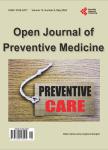How Growth Ability of Multidrug-Resistant Escherichia coli Is Affected by Abiotic Stress Factors
如何多药耐药的大肠杆菌的生长能力是由非生物胁迫因子的影响作者机构:CIIMAR—Interdisciplinary Center for Marine and Environmental ResearchUniversity of PortoPortoPortugal ICBAS—Institute Abel Salazar for the Biomedical SciencesUniversity of PortoPortoPortugal FCUP—Faculty of SciencesUniversity of PortoPortoPortugal Servico de MicrobiologiaCentro Hospitalar do PortoHospital Geral de Santo AntonioPortoPortugal
出 版 物:《Open Journal of Preventive Medicine》 (预防医学期刊(英文))
年 卷 期:2014年第4卷第5期
页 面:250-256页
学科分类:1002[医学-临床医学] 100214[医学-肿瘤学] 10[医学]
主 题:Escherichia coli Multidrug Resistance Nutrient Deprivation pH Salinity
摘 要:The ability of multidrug-resistant Escherichia coli to adapt and grow in a wide range of different environmental conditions may be crucial to the global spread of antimicrobial resistance. The aim of this study was to evaluate the survival ability of 54 multidrug-resistant E. coli strains, isolated from three different biotopes (clinical setting, gull intestine, river water) when subjected to variations in pH (from 3 to 11) and salinity (from 0.5% to 6% of NaCl) and to nutrient deprivation. The growth of each isolate as well as of a reference strain was assessed during 168 h in every varying condition. Slight variations in the growth ability under some abiotic stress factors were recorded among the isolates from the different biotopes. Multidrug-resistant isolates from gull feces were found to be the more tolerant to environmental abiotic changes, while isolates from river water were the less tolerant. In addition, it was notorious that the carriage of antimicrobial resistance has a clear fitness cost in comparison with the susceptible (reference) strain, highlighting the necessity of reducing the selective pressure exerted by antibiotics. This study underlines the ecological hardness of multidrug-resistant E. coli isolates with a consequent ability to reach and colonize new host and environments.



